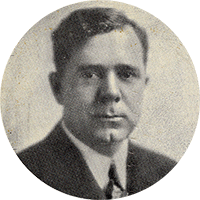Huey Long's trusted friend, O.K. Allen, was governor of Louisiana at the time of Long’s assassination in September 1935 and died shortly before his own term of office ended. Long supporter James A. Noe then served briefly as governor, finishing Allen's term.
The gubernatorial ticket of Judge Richard W. Leche (see bio below) and Huey's brother, Earl K. Long, for Lieutenant Governor won the 1936 election in a record-breaking landslide. They campaigned entirely on Huey's martyrdom, and took their oaths under a colossal portrait of the Kingfish. Like Allen and Noe, Governor Leche continued Huey Long's program of helping the poor, building more roads, bridges, hospitals, and schools, and providing free school supplies.
Unfortunately, before Governor Leche's term ended there was another kind of landslide – an avalanche of indictments. Without Huey Long's strong leadership to keep state officials in line, Louisiana's government descended into a free-for-all of corruption and graft.
Hundreds of government officials and businessmen were implicated in wrongdoing, and many were indicted. Millions in state funds were stolen. Ultimately, seven people were imprisoned including Governor Richard Leche, who served five years in federal prison for taking kickbacks on state purchases, and LSU President Dr. James Monroe Smith, who gambled away school money.
Upon Governor Leche's resignation in 1939, Earl Long served out his term of office. Earl Long was never implicated in wrongdoing and became an enormously popular political figure in his own right, successfully running for governor in 1948 and 1956 and expanding the work his brother began.
Altogether, twelve members of the Long family entered politics and held the public’s trust for decades — free of scandal. The Long political dynasty numbers two governors, three U.S. Senators, four U.S. Representatives, three state legislators, and other state and local officials.




